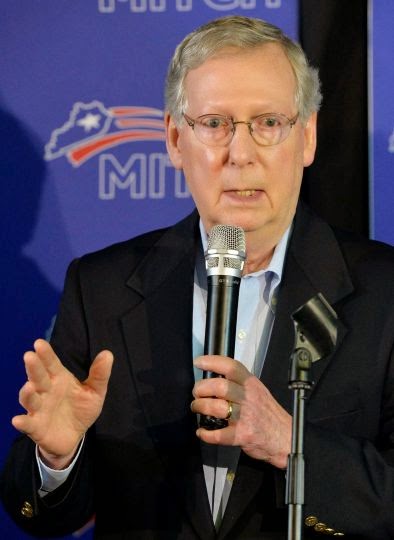McConnell presses Democratic foe Grimes to say how she feels about Obamacare, but won’t bite on questions about Kynect

Kentucky Health News
At his first press conference after winning the Republican nomination for a sixth term, U.S. Sen. Mitch McConnell pressed Democratic nominee Alison Lundergan Grimes to clarify her position on the federal health-care reform law but wouldn’t say whether his plan to “start over” on the issue would include shutting down the state’s successful health-insurance exchange.
“She’s been dodging it for a year,” McConnell said Friday. “She’s been in this race for a year. It’s time for her to answer the question, “How do you feel about it?” Grimes, Kentucky’s secretary of state, twice refused Wednesday to say how she would have voted on the 2010 law if she had been a senator.
 |
| McConnell speaks at half-hour press conference. (Associated Press photo by Timothy D. Easley) |
The topic arose when McConnell was asked to reply to Democratic assertions that his pledge to “pull it out root and branch” would end the law’s insurance coverage for 415,000 Kentuckians through the state exchange.
Asked if he would dismantle the state exchanges created under the law, McConnell said he would have created a national market — “tear down the walls, the 50 separate silos in which health insurance is sold” — passed medical-malpractice reform, and allowed small businesses to “band together in this international [sic] market.”
Asked again, specifically, if he would shut down Kentucky’s exchange, which is branded as Kynect, he said “I think that’s unconnected to my comments about the overall question here.”
While polls have shown the law to be unpopular in Kentucky, a small plurality of voters in a recent poll had a favorable opinion of Kynect. Last fall, the Kentucky Health Issues Poll found that people who weren’t sure how the law would affect them and their families had an unfavorable opinion of it, while those who said they did know how it would affect them had a favorable opinion.
In his overall comments about the law, McConnell said a Congressional Budget Office study has predicted that full implementation of the law would still leave 30 million Americans uninsured, covering only 10 million. “What is the cost-benefit ratio of this kind of destruction, this kind of impact, on 16 percent of the economy?” he asked. “The people of this state are entitled to know the answer to the question, ‘How do you feel about it?’ and I think my opponent has tried to dodge that question.”
UPDATE: Joe Sonka of LEO Weekly writes, “According to the CBO, by 2024 the number of uninsured will, in fact, be 31 million people, but without the ACA there would have been 56 million people uninsured. This number takes into account the undocumented immigrants who can’t get insurance because of the lack of immigration reform, and the people who can’t get Medicaid in states that opted out of the Medicaid expansion. That means that when the ACA ‘kicks in fully’ . . . 26 million will have gained access to health-care coverage because of it.”
Asked if repealing the law would be his top priority as majority leader if Republicans take control of the Senate, he said he wasn’t ready to say because he’s not in the majority yet, “but I think it’s reasonable to assume that would be a high priority for us.” He noted that Obama will be president until January 2017, an implicit acknowledgement that Obama would veto any repeal and two-thirds votes of the House and Senate would be required to override him.
Jason Millman of The Washington Post writes that the issue could be pivotal in the race. “Kentucky is about as big of an Obamacare paradox that you could find:
the state’s exchange is working well, but Obamacare remains unpopular in
the state,” he writes. “It’s also home to one of the more successful
Obamacare health insurance exchanges.” He concludes, “Grimes may want to have a better answer the next time she’s asked whether she would have voted for the health-care law.” She has refused to say.